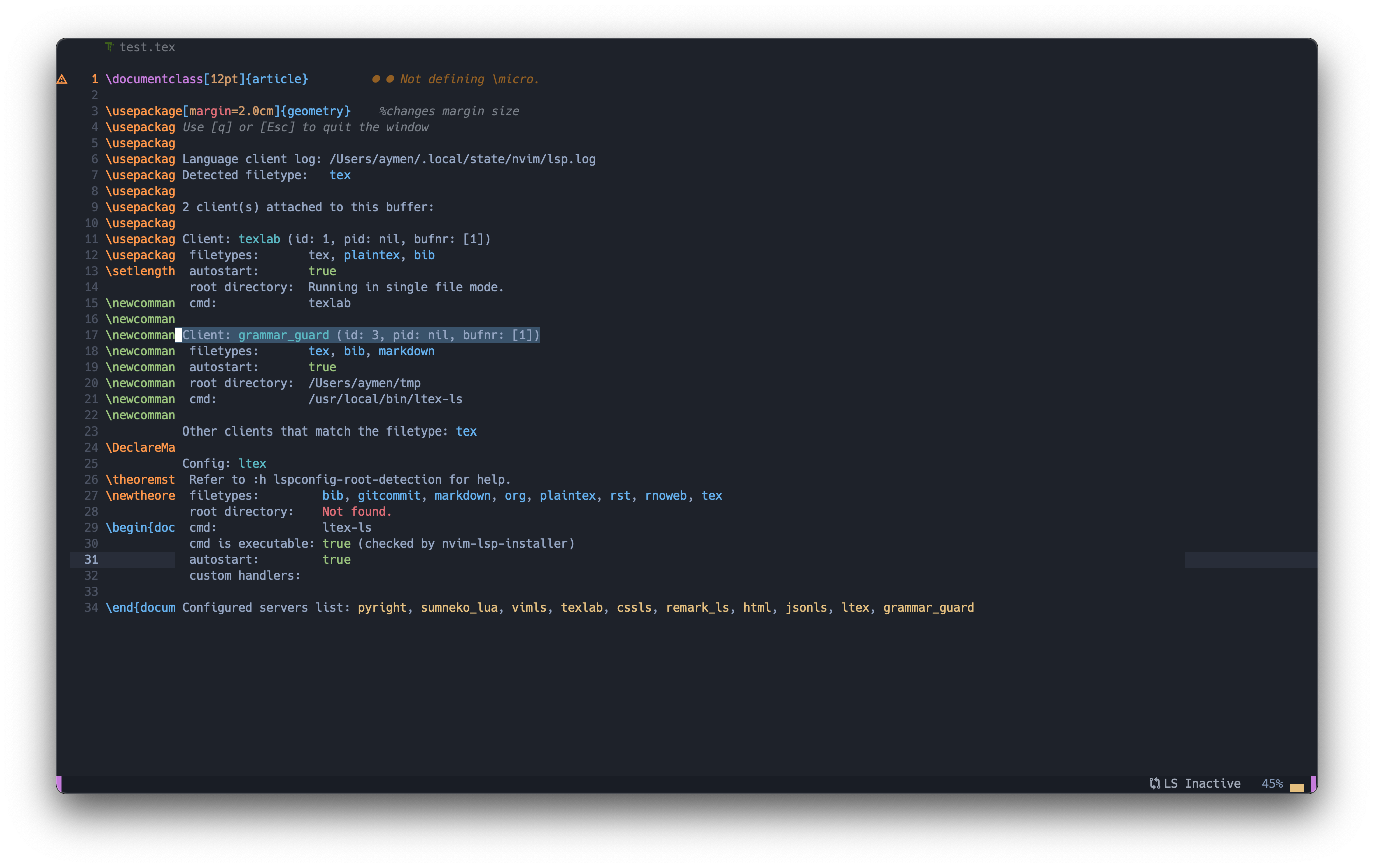Grammar checking in Neovim
Setting up grammar checking with Neovim’s native LSP client and grammar-guard
I use Neovim these days primarily for writing in LaTeX, as well as some light Python development for hobby projects. The core of my LaTeX workflow is made up of using Ultisnips as my snippet engine and a couple of janky mappings to compile and show a PDF preview.

Combined with Neovim’s native LSP and nvim-cmp for completion suggestions, this creates a fast and seamless writing environment. Though Neovim has a built-in spell checker, one thing I was missing was some sort of system to check grammar while writing. This doesn’t seem essential but a quick way of checking for grammatical errors can be convenient, particularly when writing important documents or reports. After some research I came across a plug-in called grammar-guard, which uses the ltex language server to carry out grammar checks and give suggestions. This was exactly what I was looking for.
Getting it setup is relatively straightforward, as described by the documentation. The plug-in itself can be installed with whatever plug-in manager you use, for example with packer.nvim,
use {
"brymer-meneses/grammar-guard.nvim",
requires = {
"neovim/nvim-lspconfig",
"williamboman/nvim-lsp-installer"
}
}
nvim-lspconfig provides configurations for Neovim’s LSP client and nvim-lsp-installer allows you to easily manage and install LSP servers. Once these are installed we need to install the ltex-ls language server. On macOS, I installed it via homebrew:
brew install ltex-ls
After that, grammar-guard needs to be enabled with the LSP. First, initialising grammar-guard:
require("grammar-guard").init()
Grammar-guard isn’t itself a language sever. But because it uses ltex, it can be
configured with lspconfig like any other server:
require("lspconfig").grammar_guard.setup({
on_attach = handlers.on_attach,
capabilities = capabilities,
cmd = { "/usr/local/bin/ltex-ls" },
settings = {
ltex = {
enabled = { "latex", "tex", "bib", "markdown" },
language = "en-GB",
diagnosticSeverity = "info",
checkFrequency = "save",
setenceCacheSize = 2000,
additionalRules = {
enablePickyRules = false,
},
trace = { server = "verbose" },
disabledRules = {
["en-GB"] = { "MORFOLOGIK_RULE_EN_GB" },
},
},
},
})
Here, on_attach is a function which can be used to provide settings and
mappings that can be called specifically when a language server attaches to
a buffer. The specifics of this go a bit beyond the scope of this post, so I may
go more into the details in a separate post about how I have LSP and nvim-cmp
setup. I find the spell-checking provided by grammar-guard really annoying as it
marks spelling errors in code blocks, as well as in LaTeX commands. The
disabledRules table disables this. Neovim’s built-in spellchecker works fine
for me.

Now, opening up a tex or markdown file, grammar-guard should be up and running.
And running :LspInfo shows information about the servers attached to the current
buffer.
I am slightly in two minds about whether this will be a permanent addition to my configuration as it can be quite slow to start up, and it still gives some spelling recommendations. But otherwise, it’s a pretty cool tool.
